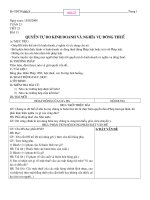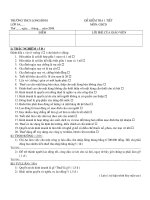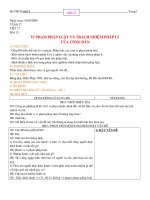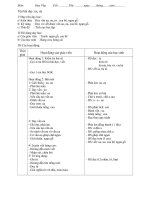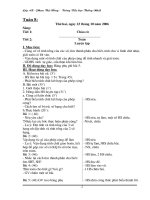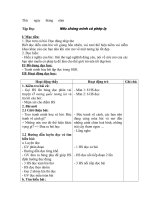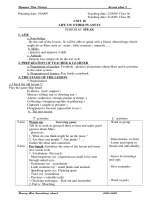GIAO AN 9 TUAN 8 THEO PPCT MOI NHAT TINH THAI BINH
Bạn đang xem bản rút gọn của tài liệu. Xem và tải ngay bản đầy đủ của tài liệu tại đây (159.63 KB, 6 trang )
<span class='text_page_counter'>(1)</span><div class='page_container' data-page=1>
<b>Tuần 8</b>
<b>Tiết 15</b> <i>Ngày soạn: 17 / 09 / 2010Ngày dạy : 04 / 10 / 2010</i>
<b>UNIT 3: A TRIP TO THE COUNTRYSIDE </b>
LESSON1: Getting started + Listen and read.
<b>I. Objectives:</b>
After the lesson students will be able to talk about life and activities in the
countryside.
<b>II. Language content </b>
<b>Vocabulary: home village, a bamboo forest, a banyan tree, a shrine, a hero</b>….
<b>Grammar: Modal could with wish, simple past with wish ( review).</b>
<b>III. Method: </b>
Ask – answer.
Individually.
Team work.
Communicative approach.
<b>IV. Teaching aids:</b>
Posters.
Tape and cassette.
Flashcards.
Pictures.
Students’ books.
<b>V.Procedures:</b>
<b>1. Warm up (7 minutes)</b>
Teacher Students
- Ask students some questions about the
countryside.
+ Have you ever been to the countryside?
+ Do you live in the countryside?
+ Do you like the country life?
+ What activities do you usually see in the
country?
- Ask Ss to look at the picture in 20 '' then
write the activities in the picture.
- Look at the pictures, take turn to talk
about activities in the countryside.
- Give the feed back.
- Answer T’s questions.
- Work in 4 groups.
- Hang the extra boards then compare the
answers.
1. She’s watering the vegetables.
2. They are swimming
3. She’s collecting the chicken egg.
4.They’re harvesting the crop.
5. He’s feeding the pig
6. He’s plowing the field.
7. A buffalo boy is flying his kite.
8. Some children are playing football.
<b>2. Presentation (10 minutes) </b>
</div>
<span class='text_page_counter'>(2)</span><div class='page_container' data-page=2>
- Pre – teach vocabulary:
explanation
visual / realia
picture
synonym
example
- Guide Ss to read the new words.
- Give the game of “What and Where”.
<i>- Now, you are going to listen the text</i>
<i>about the trip to the countryside of Ba s</i>’
<i>family. Please listen and answer the</i>
<i>questions:</i>
+ When did Ba, Liz and his family go to his
home village?
+ What did Liz think of the trip?
+ home village (n) : quê hơng
+ bamboo forest (n) : luỹ tre
+ banyan tree (n) : cây đa
+ shrine = a temple: đền, miếu.
+ hero (n) : anh hùng
+ entrance (n): lối vào.
- Repeat in chorus.
- Repeat individually.
- Take note.
- Play game in two teams of five.
- Prepare for listening.
<b>3. Practice (18 minutes) </b>
- Open the tape and then call Ss to answer
the questions.
<i>II. Practice:</i>
- Listen to the tape then answer the
questions
+ They went on Sunday.
- Ask Ss to read the text silently and do
exercise 1 (p 23).
- Call Ss give their ideas.
- Give the feed back.
1. Ba and his family had a two – day trip
to their home village.
2. Many people like going there for their
weekend.
3. There is a small bamboo forest at the
entrance to the village.
4. Liz had a snack at the house of Ba’s
uncle.
5. There is a shrine on the mountain near
Ba’s village.
6. Everyone had a picnic on the mountain.
7. Everyone left the village late in the
evening.
8. Liz had a videotape to show the trip to
her parents.
9. Liz wants to go there again.
+ Liz enjoyed the trip very much and took a
lot of photos.
<i>Exercise a) True or False</i>
- Do individually. Swap with their partners.
- Some Ss give their ideas. Others listen to
them and remark.
1. F (Ba and his family had a day trip to
their home village.
2. T
3. F. (There’s an old banyan tree at the
entrance to the village.)
4. F. (People had a snack under the banyan
tree.)
5. T.
6. F. (They had a picnic on the river bank)
7. T.
8. F. (Liz took a lot of photos to show the
trip to her parents.)
9. T.
hero Home village
shrine <sub>Banya</sub>
n
</div>
<span class='text_page_counter'>(3)</span><div class='page_container' data-page=3>
- Call some Ss to read the text loudly.
- Ask Ss to ask and answer the questions in
the Ss’ books (p. 23)
- Give the game of “Lucky numbers” to
get the correct answers to the
questions.
11 2. Q1 3. Q4 4. Q7 11
6. Q2 7. Q6 11 9. Q5 10.Q3
1. Where is Ba’ village?
2. How did Ba and his family get to the
village?
3. Where is the banyan tree?
4. What did they see on the mountain?
5. Where did they have their picnic?
6. What did Liz do to show the trip to her
parents?
7. What does Liz wish?
- 3 Ss read the text in front o the class.
- Work in pairs.
<i>Exercise b) Answer</i>
- Play game in two teams.
1. It’s 60 km to the north of Hanoi.
2. They got to the village by bus.
3. It’s at the entrance to the village.
4. They saw the shrine of a Vietnamese
hero on the mountain.
5. They had a picnic on the river bank
6. Liz took a lot of photos to show her
parents.
7. Liz wishes she could visit Ba’s village
again.
<b>4. Production (7 minutes)</b>
- Ask Ss to read the text once more and find * Structure:
out the structure they have learned in Unit
1.
- C©u mong íc trong t¬ng lai:
VD: We wish we could go to Ho Chi Minh
City this summer.
+ Liz wishes she would stay in Viet Nam
longer.
- Ask Ss to do the exercise with the new
structure.
<i>Vicky is fed up. What is she saying? Use I</i>
<i>wish.</i>
1. She can’t think straight.
2. She is so tired.
3. She gets headaches.
4. Her work isn’t going well.
5. She can’t concentrate on her work.
6. She doesn’t know what to do.
7. She likes to go on a travel to somewhere.
8. Life is so complicated.
- Show the new structure.
+ I wish I could visit your village again.
S + wish / wishes + S + could / would + V
.
…
1. I wish I could think straight.
2. I wish I weren’t so tired.
3. I wish I didn’t get headaches.
4. I wish my work were going well.
5. I wish I could concentrate on my work.
6. I wish I knew what to do.
7. I wish I could go on a travel.
8. I wish life were simple.
<b>5. Homework (3 minutes) </b>
Learn by heart all the new words and structure.
Read the text fluently.
Do exercise 1, 2 (p. 20) in workbook.
Prepare for UNIT 3 – Lesson 2: Speak + Listen.
<b>Tuần 8</b>
<b>Tiết 16</b> <i>Ngày soạn: 22 / 09 / 2010Ngày dạy : 06 / 10 / 2010</i>
<b>UNIT 3: A TRIP TO THE COUNTRYSIDE </b>
</div>
<span class='text_page_counter'>(4)</span><div class='page_container' data-page=4>
Ask for and give information about their own village.
Listen and fill the place in their right position on the map.
<b>II. Language content </b>
<b>Vocabulary: </b>route , pond, parking lot, pick someone up, gas station, Dragon bridge,
pond,…
<b>Grammar: preposition of time, simple past with wish( review).</b>
<b>III. Method: </b>
Ask – answer.
Individually.
Pair work.
Communicative approach.
<b>IV. Teaching aids:</b>
Posters.
Students’ books.
Picture.
Tape and cassette.
Flashcards.
<b>V.Procedures:</b>
<b>1. Warm up (7 minutes)</b>
Teacher Students
- Ask some questions about Ba’s home
village.
+ Where is Ba’s home village?
+ How far is it from Ha Noi to his home
village?
+ How can Ba get to his home village?
+ How long does it take to get to his home
village by bus?
+ Does his home village have a river?
- Last lesson we have learned about Ba s’
<i>home village. Today we are going to talk</i>
<i>about our home village.</i>
- Listen to the teacher then answer the
questions.
+ It’s to the north of Ha Noi.
+ It’s about 60 km.
+ He can get there by bus.
+ Two hours.
+ Yes, it has a river.
- Listen to the teacher’s introduction.
<b>2. Speaking (15 minutes) </b>
<i>* Pre </i>–<i> speaking (3 minutes) </i>
- Give the game of “Noughts and crosses”.
1. Where’s your home village?
2. How often do you go to your village?
3. How far is it from the city?
4. What can you see on the way to...?
5. What activities are there in the
countryside?
6. Is a lake, a pond, a river...in your village?
7. How can you get there?
8. How long does it take you to get there?
9. Which of interesting place would you
<i>I. Speaking.</i>
- Play game in two teams to answer T’s
questions.
One team is (O), the other is (X).
1. 2. 3.
4. 5. 6.
7. 8. 9.
1. My home village is ...
</div>
<span class='text_page_counter'>(5)</span><div class='page_container' data-page=5>
8. It takes me….
9. If you have time, please...to my home
like to show us?
<i>* While </i>–<i> speaking (12 minutes) </i>
- Have students read the questions in
exercise (a) and work in pairs, play the role
of A and B ask and answer about the
partner’s home village using the
information in the box.
- Call some pairs to practice speaking in
front of the class. (Correct the mistakes if
there are)
village and I’ll take you to...and try special
food such as...
- Work in close pairs.
- Some open pairs practice loudly.
A: Where is your home village?
B: It’s to the west of the city.
A: How far is it from the city?
B: It’s about 15 km from the city.
A: How can you get there?
B: We can get there by bus
A: How long does it take to get there?
B: It takes an hour.
A: What do people do for a living?
B: They plant rice and raise cattle.
A: Does your village have a river?
B: There aren’t any rivers but there is a big
lake.
<b>3. Listening (13 minutes) </b>
* Pre – listening (3 minutes)
explanation
picture
definition
translation
- Ask Ss to look at the map then prepare for
listening.
- Open the tape three times.
- Call some Ss to read their answers.
- Check the answer by listing once more.
<i>II. Listening </i>
1. New words:
+ route: tuyến đờng, lộ trình.
+ pond: cái ao
+ parking lot = car park: bến xe.
+ pick someone up :đón (ai lên xe)
2. Look at the map. Listen to the trip to Ba’s
village. Match the places.
- Listen and do exercise individually.
- Read their answers.
- Check the answer.
- Take note.
<i>At 6. 30 in the morning, the bus collected</i>
<i>Ba and his family from their home. After</i>
<i>picking everyone up, the bus continued</i>
<i>north on Highway Number 1. It crossed</i>
<i>the Dragon Bridge and stopped at the gas</i>
<i><b>station to get some more fuel. Then it left</b></i>
<i>the highway and turned left onto a smaller</i>
<i>road westward. This road went between</i>
</div>
<span class='text_page_counter'>(6)</span><div class='page_container' data-page=6>
<i>green paddy fields, so the people on the bus</i>
<i>can see a lot of cows and buffaloes. The</i>
<i>road ended before a big store beside a</i>
<i><b>pond. In stead of turning left towards a</b></i>
<i>small airport, the bus went in the opposite</i>
<i>direction. It didn t stay on that road for</i>’
<i>very long, but turned left onto a road which</i>
<i>went through a small bamboo forest.</i>
<i>Finally, the bus dropped everyone in the</i>
<i><b>parking lot ten meters from a big old</b></i>
<i><b>banyan tree. It parked there and waited for</b></i>
<i>people to come back in the evening. </i>
<i>F: Store.</i>
<i>G: Pond</i>
<i>B: Airport</i>
<i>H: Bamboo forest</i>
<i>I: Parking lot</i>
<i>A: Banyan tree</i>
<b>4. Production (7 minutes)</b>
- Make a survey about the classmates’
home village.
- Call 2 Ss to report their survey in front of
the class.
- Make survey.
Name
Place
...km
...by
time
produce
sights
- 2 Ss report their survey
Ex: Nam’s home village is in Thai Thuy.
It’s to the south of Thai Binh city.
It’s about 25 km from the city. He often
goes there on the weekend. It often takes
him 50 minutes to get there by motorbike.
On the motorbike, he can see a lot of
beautiful sights, trees , rice paddies, cows
or buffaloes grazing along the roads.
There’s a river called “Tra Ly” and most
people live on planting rice, vegetables and
raise chickens, ducks and animals. They’re
very friendly.
<b>5. Homework (3 minutes) </b>
Write it up from the survey
</div>
<!--links-->
